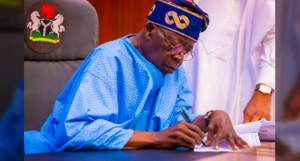Former Vice President Atiku Abubakar has delivered a scathing critique of President Bola Tinubu’s administration, highlighting what he perceives as the President’s failure to fulfill his promises of economic growth and alleviating the suffering of Nigerians.
Tinubu, who assumed office in May of the previous year, introduced a series of ambitious reforms aimed at revitalizing the economy and attracting investment. However, these initiatives have precipitated a short-term surge in living costs, leading to widespread discontent among the populace.
In his evaluation of Tinubu’s first year in office, Atiku asserted that the nation’s economic situation has deteriorated significantly under the current administration. “Predictably, 12 months on, Tinubu’s pledge of growing the economy and ending misery remains unfulfilled,”Atiku stated
He emphasized that Tinubu’s actions, or lack thereof, have exacerbated Nigeria’s macroeconomic instability. “Nigeria remains a struggling economy and is more fragile today than it was a year ago. Indeed, all the economic ills – joblessness, poverty, and misery – which defined the Buhari-led administration have only worsened,” Atiku added.
According to Atiku, Africa’s once-leading economy has now slipped to fourth place, trailing behind Algeria, Egypt, and South Africa. This decline, he argues, is a stark contrast to the administration’s promises of renewed hope and economic prosperity. “Citizens’ hopes have been dashed, contrary to the administration’s propaganda, as Nigeria’s economic woes have multiplied,” he lamented.
One of the most contentious measures undertaken by Tinubu’s administration has been the removal of fuel subsidies, a move intended to reduce government expenditure and redirect funds towards more productive sectors.
However, this policy has led to skyrocketing costs of living and transportation, placing an additional burden on already struggling Nigerians. Atiku criticized these measures, describing them as part of a “cocktail of policies” implemented without a coherent plan to achieve the promised economic transformation.
Atiku’s critique extends beyond mere policy disapproval; he questions the very efficacy and strategic direction of Tinubu’s economic agenda. “Despite high hopes when Tinubu assumed the reins last May, Nigeria is worse off,” Atiku remarked. He pointed out that the removal of fuel subsidies,
while theoretically sound, was executed in a manner that failed to consider the immediate impact on the most vulnerable segments of society. This has led to increased hardship and disillusionment among Nigerians, many of whom had hoped for a more prosperous and stable future under Tinubu’s leadership.
 Furthermore, Atiku highlighted the broader implications of Tinubu’s policies on Nigeria’s standing in Africa. “Nigeria remains a struggling economy and is more fragile today than it was a year ago,” he reiterated. “Indeed, all the economic ills — joblessness, poverty, and misery — which defined the Buhari-led administration have only exacerbated.” This deterioration, according to Atiku, is not just a domestic concern but a regional one, as Nigeria’s economic performance has historically set the tone for West Africa and beyond.
Furthermore, Atiku highlighted the broader implications of Tinubu’s policies on Nigeria’s standing in Africa. “Nigeria remains a struggling economy and is more fragile today than it was a year ago,” he reiterated. “Indeed, all the economic ills — joblessness, poverty, and misery — which defined the Buhari-led administration have only exacerbated.” This deterioration, according to Atiku, is not just a domestic concern but a regional one, as Nigeria’s economic performance has historically set the tone for West Africa and beyond.
Atiku’s appraisal of Tinubu’s first year in office is not just a critique but a call to action. He urged the current administration to adopt a more strategic and inclusive approach to economic management. “The administration must go beyond superficial reforms and engage in deep, structural changes that address the root causes of our economic challenges,” he advised. This includes not only tackling immediate issues like fuel subsidies and inflation but also investing in long-term solutions such as education, healthcare, and infrastructure development.
In conclusion, Atiku Abubakar’s assessment of President Bola Tinubu’s performance is a sobering reminder of the challenges that Nigeria continues to face. While Tinubu’s administration has embarked on several significant reforms, the former Vice President argues that these measures have yet to yield the promised benefits. Instead, he contends, they have deepened the economic hardships experienced by many Nigerians.
As the country navigates these tumultuous times, the need for effective, compassionate, and strategic governance has never been more critical. Atiku’s critique serves as both a reflection on the past year and a call for more robust and inclusive economic policies that truly address the needs and aspirations of the Nigerian people.




